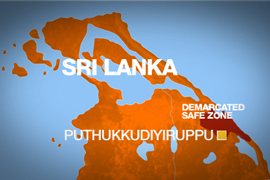Sri Lanka rebels call for ceasefire
Tamil Tigers seek international arranged truce but dismiss government’s offer as insincere.

“They can’t talk about a political settlement to buy time to regroup,” Lakshman Yapa Abeywardena, a government spokesman, said.
Fighting suspended
The government’s stepped-up offensive against the LTTE, led by V Prabhakaran, has cornered the group in a narrow strip of jungle in Sri Lanka’s northeast.
The current lull in fighting was imposed by the government on Monday during the Sri Lankan new year. There have been no reported confrontations.
The military asked tens of thousands of civilians in a so-called safe zone in the northeast to take advantage of the two-day lull to escape.
 |
However, only about 44 people crossed into government territory on the first day and the LTTE’s statement called the present two-day lull an “act of hoodwinking” by the government.
“We consider this ceasefire announcement of Sri Lanka government as a two-day holiday opportunity availed to its servicemen for Sinhala New year,” the statement said.
It said that despite the announcement government forces continue to target civilians.
The LTTE statement said that “ceasefire under the auspices of the international community alone, will be effective and productive”.
A series of battlefield victories by the government have sapped the strength of the LTTE, which once ran a de facto state in the north and east of Sri Lanka.
Official reaction
The government has rejected several calls for a new permanent ceasefire, saying the military will soon defeat the Tigers.
The government barred Norway on Monday from international efforts to mediate a peace in Sri Lanka, after protesters in Oslo, the Norwegian capital, briefly raided the Sri Lankan embassy there.
The LTTE has been waging an armed campaign for 25 years to create an independent homeland for ethnic minority Tamils, who have faced decades of marginalisation by successive governments controlled by the Sinhalese majority.
More than 70,000 people have been killed in the violence.